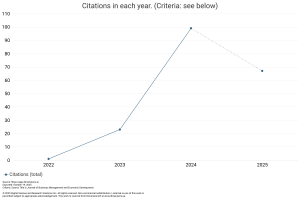Transformation of Student Leadership: Adopting Entrepreneurship to Face Global Challenges
DOI:
https://doi.org/10.59653/jbmed.v2i03.921Keywords:
Entrepreneurship in Education, , Human Resource Development, Leadership StyleAbstract
This research aims to highlight the value of entrepreneurial leadership in developing students' leadership capabilities. By using various leadership styles, this research attempts to provide insights into how entrepreneurial leadership can be applied in higher education to improve the human resources, industry, and education sectors. Various leadership philosophies have been applied in entrepreneurial endeavors over the past few years, but more research is needed to identify the most effective leadership styles, especially for university students. The results of this study suggest that different entrepreneurial leadership approaches and leadership philosophies among university students may contribute to the development of characters who are creative, well-behaved, and possess important leadership qualities.
Downloads
References
Abdul Aziz, S. A., & Zainal Abiddin, N. (2022). Leadership Style and Entrepreneurial Leadership among University Students: A Literature Review. In International Journal of Learning and Development (Vol. 12, Issue 3, p. 15). Macrothink Institute, Inc. https://doi.org/10.5296/ijld.v12i3.20045
Abdullah, H. O., Atshan, N., Al-Abrrow, H., Alnoor, A., Valeri, M., & Erkol Bayram, G. (2023). Leadership styles and sustainable organizational energy in family business: modeling non-compensatory and nonlinear relationships. In Journal of Family Business Management (Vol. 13, Issue 4, pp. 1104–1131). Emerald. https://doi.org/10.1108/JFBM-09-2022-0113
Ade Wimbo Brasrinanto, & Susanto Sukiman. (2022). The Effect of Leadership Style on Employee Performance Mediated by Organizational Culture and Employee Motivation Bureau of Government and Regional Autonomy Regional Secretariat East Java Province. In Sinergi : Jurnal Ilmiah Ilmu Manajemen (Vol. 12, Issue 1, pp. 1–7). Dr. Soetomo University. https://doi.org/10.25139/sng.v12i1.5688
Aesah, S., Suprapti, E., & Hernawati, S. P. (2023). The Influence of Work Motivation and Leadership Style on Employee Performance. In International Journal of Indonesian Business Review (Vol. 2, Issue 2, pp. 162–175). Asosiasi Dosen Peneliti Ilmu Ekonomi dan Bisnis Indonesia. https://doi.org/10.54099/ijibr.v2i2.679
Aferi, A., Amali Rivai, H., & Lukito, H. (2023). The Effect of Transformational Leadership Style on Organizational Commitment, Employee Engagement, and Employee Performance at Pt. Pln (Persero) Up3 Bukittinggi. In Journal of Economics, Finance and Management Studies (Vol. 06, Issue 05). Everant Journals. https://doi.org/10.47191/jefms/v6-i5-10
Al-Dossary, R. N. (2022). Leadership Style, Work Engagement and Organizational Commitment Among Nurses in Saudi Arabian Hospitals. In Journal of Healthcare Leadership (Vol. 14, pp. 71–81). Informa UK Limited. https://doi.org/10.2147/JHL.S365526
Al-shami, S., Jamal Rafeea, S., Al-mamun, A., & Sidek, S. (2022). The Influence of Transformational Leadership on Organisational Performance Through Corporate Entrepreneurship and Absorptive Capacity. In SSRN Electronic Journal. Elsevier BV. https://doi.org/10.2139/ssrn.4050418
Ali Ibreekaw, N. S. (2022). The Effect of Leadership Style on Nurse Job Satisfaction, Mediated by Empowerment and Commitment. Ra Journal of Applied Research, 08(04), 299–302. https://doi.org/10.47191/rajar/v8i4.13
Apipudin, A. (2022). Al-Ikhshid’s Strategy and Leadership Style. In Eduvest - Journal of Universal Studies (Vol. 2, Issue 11, pp. 2469–2484). Green Publisher. https://doi.org/10.59188/eduvest.v2i11.657
Aryan Torrido. (2023). Effective Leadership and Social Entrepreneurship Engagement in Optimal MSMEs Performance. In MIMBAR : Jurnal Sosial dan Pembangunan (pp. 257–264). Universitas Islam Bandung (Unisba). https://doi.org/10.29313/mimbar.vi.2076
Awamleh, F. T. (2022). Charismatic Leadership Style to Overcome Employee Resistance to the Management of Organizational Change Process. In Global Journal of Management and Business Research (pp. 11–18). Global Journals. https://doi.org/10.34257/gjmbravol22is3pg11
Budiyoko, B., Prayoga, A., Rusdah, R., Mehmet Sıtkı İlkay, Abdulhakim Madiyoh, Satriana, E. D., & Afrianto, W. F. (2024). Business Model for Small-Scale Artisan Tea Family Business. In TIJAB (The International Journal of Applied Business) (Vol. 8, Issue 1, pp. 70–87). Universitas Airlangga. https://doi.org/10.20473/tijab.v8.i1.2024.44036
C. (2022). Gaya Kepemimpinan Otoriter Dan Kepemimpinan Kristen Terhadap Kariawan. In FILADELFIA: Jurnal Teologi dan Pendidikan Kristen (Vol. 3, Issue 1, pp. 301–320). Sekolah Tinggi Teologi Imanuel Pacet. https://doi.org/10.55772/filadelfia.v3i1.49
Cahya Dwi Hardin, O., Krisnandi, H., & Digdowiseiso, K. (2024). The Influence of Compensation, Transactional Leadership Style, Motivation and Work Discipline on Employee Performance in The South Jakarta City Fire and Rescue Department. In Journal of Social Science (Vol. 5, Issue 3, pp. 726–737). Ridwan Institute. https://doi.org/10.46799/jss.v5i3.823
D.J., D., & E.J., C. (2023). Appraisal of Leadership Styles on the Organisational Performance of National Agricultural Seeds Council, Abuja Nigeria. In International Journal of Entrepreneurship and Business Innovation (Vol. 6, Issue 2, pp. 190–209). African - British Journals. https://doi.org/10.52589/ijebi-dxsm0dfq
Danang Setya Budi, & Adi Susilo Jahja. (2023). The Effect of Compensation and Leadership Style on Turnover Intention with Work Motivation as Intervening Variable at PNM Mekaar Regional Mojokerto. In Formosa Journal of Sustainable Research (Vol. 2, Issue 8, pp. 1843–1864). PT Formosa Cendekia Global. https://doi.org/10.55927/fjsr.v2i8.5425
Dey, S., Patra, A., Giri, D., & Madrecha, K. (2022). From traditional leadership to transformative leadership: A conceptual study on the Leadership Style of the School Principals. In International Journal of Management and Development Studies (Vol. 11, Issue 02, pp. 01–14). International Journal of Management and Development Studies. https://doi.org/10.53983/ijmds.v11n02.001
Dogan, B., & Yıldız, B. (2023). The Correlation between Leadership Styles and Organizational Cynicism: Which Leadership Style is Best for Schools? In International Journal of Education and Literacy Studies (Vol. 11, Issue 4, pp. 343–352). Australian International Academic Centre. https://doi.org/10.7575/aiac.ijels.v.11n.4p.343
Dolar, B., & Biloslavo, R. (2023). The Process of the Intergenerational Succession of Leadership in a Family Business. In Economic and Business Review (Vol. 25, Issue 1, pp. 24–40). School of Economics and Business University of Ljubljana. https://doi.org/10.15458/2335-4216.1316
Emeanulu, L. U., & Sayed, H. (2024). The Influence of Transformational Leadership Style on Students’ Learning Motivation in UK Universities. In OALib (Vol. 11, Issue 03, pp. 1–21). Scientific Research Publishing, Inc. https://doi.org/10.4236/oalib.1111295
Fakhira Khairani, & Ainun Mardhiyah. (2024). The Influence of Human Relations, Work Discipline and Work Environment on Employee Performance at PT Bank. Journal of Finance and Business Digital, 2(4), 587–600. https://doi.org/10.55927/jfbd.v2i4.6505
Huda, K., Sholeh, R., Waluyo, S. E. Y., & Efendi, M. J. (2023). Employee Performance: Communication, Group Collaboration, Leadership and Motivation. In IJEBD (International Journal of Entrepreneurship and Business Development) (Vol. 6, Issue 4, pp. 749–757). Narotama University. https://doi.org/10.29138/ijebd.v6i4.2302
Khaskhelly, I. Z. (2023). Effect of Transformational Leadership on Firm Performance: Mediating Role of Employee Self-Efficacy and Work Engagement. In Journal of Entrepreneurship, Management, and Innovation (Vol. 5, Issue 5, pp. 806–820). Coral Publications, Coral Research and Education Systems. https://doi.org/10.52633/jemi.v5i5.356
Laloo, E. (2022). Ubuntu Leadership – An explication of an Afrocentric leadership style. In The Journal of Values-Based Leadership (Vol. 15, Issue 2). Valparaiso University. https://doi.org/10.22543/1948-0733.1383
Meirinhos, G., Cardoso, A., Neves, M., Silva, R., & Rêgo, R. (2023). Leadership Styles, Motivation, Communication and Reward Systems in Business Performance. In Journal of Risk and Financial Management (Vol. 16, Issue 2, p. 70). MDPI AG. https://doi.org/10.3390/jrfm16020070
Mosey, S., Shipway, R., & Symons, C. (2022). Entrepreneurial Culture and Leadership in Sport and Leisure. In Entrepreneurship and Innovation in Sport and Leisure (pp. 61–80). Routledge. https://doi.org/10.4324/9781003217015-4
Nurfarida, I. N., Sudarmiatin, Hermawan, A., & Restuningdiah, N. (2023). Social customer relationship management and business performance: Evidence from small and medium enterprises. In Quality - Access to Success (Vol. 24, Issue 197, pp. 141–147). SynthesisHub Advance Scientific Research. https://doi.org/10.47750/QAS/24.197.16
Pasaribu, M. H. (2021). Penerapan Gaya dan Pendekatan Kepemimpinan untuk Kepemimpinan yang Efektif. In Journal Of Administration and Educational Management (ALIGNMENT) (Vol. 4, Issue 2, pp. 246–252). IPM2KPE. https://doi.org/10.31539/alignment.v4i2.2568
Pryatmoko, D. Y., & Majid, N. (2023). Implementation of PT Mulyosari Group’s Leadership Style in Improving Employee Work Performance. In International Journal of Asian Business and Management (Vol. 2, Issue 6, pp. 1013–1020). PT Formosa Cendekia Global. https://doi.org/10.55927/ijabm.v2i6.7486
Riski, A., & Rino, R. (2023). The Effect of Digital Leadership Style, Motivation, and Work Ability on Employee Performance After the Covid-19 Pandemic. In Edunesia : Jurnal Ilmiah Pendidikan (Vol. 5, Issue 1, pp. 424–441). Natural Aceh. https://doi.org/10.51276/edu.v5i1.647
Shaked, H. (2023). How Social Justice Leadership Complements Instructional Leadership. In Leadership and Policy in Schools (pp. 1–16). Informa UK Limited. https://doi.org/10.1080/15700763.2023.2282534
Sindu Bharath, P. Nagesh, & T S Nanjundeswaraswamy. (2022). Does Emotional Intelligence Influences the Leadership Style? In Journal of Advanced Research in Leadership (Vol. 1, Issue 1, pp. 33–47). Mokslines leidybos deimantas, MB. https://doi.org/10.33422/jarl.v1i1.40
Stephen, D. R. K. (2023). Exploring Correlation between Emotional Intelligence and Transformational Leadership Style of Lecturers in Universities in Kenya. In International Journal of Research Publication and Reviews (Vol. 4, Issue 3, pp. 2796–2799). Genesis Global Publication. https://doi.org/10.55248/gengpi.2023.4.33197
Umam, A. . R. (2022). The Influence of Transformational Leadership and Transactional Leadership on Motivation Moderated by Reward on Employee Performance (Study on Cv. Galaxy Mega Indah). In International Journal of Review Management Business and Entrepreneurship (RMBE) (Vol. 2, Issue 2, pp. 36–46). Universitas Ciputra Surabaya. https://doi.org/10.37715/rmbe.v2i2.3360
Vivona, R. (2023). The new era leadership for the public sector? Entrepreneurship, effectiveness, and democracy. Public Management Review, 26(6), 1566–1582. https://doi.org/10.1080/14719037.2022.2162957
Wahidah, F., Kurnia, R., & Lailisna, N. N. (2023). Woman Entrepreneurial Leadership: Kepemimpinan Perempuan Sebagai Upaya Pengembangan Jiwa Entrepreneurship Anak Usia Dini. In Egalita Jurnal Kesetaraan dan Keadilan Gender (Vol. 18, Issue 1). Maulana Malik Ibrahim State Islamic University. https://doi.org/10.18860/egalita.v18i1.17631
Yang, X. (2023). The Transactional Leadership Style of University Leaders in The Teachers Job Satisfaction in Hunan Province: Basis for Managers Leadership Program. In International Journal of Education and Humanities (Vol. 11, Issue 3, pp. 99–111). Darcy & Roy Press Co. Ltd. https://doi.org/10.54097/ijeh.v11i3.14468
Downloads
Published
How to Cite
Issue
Section
License
Copyright (c) 2024 Daniel Lukito

This work is licensed under a Creative Commons Attribution-ShareAlike 4.0 International License.
Authors who publish with this journal agree to the following terms:
- Authors retain copyright and grant the journal right of first publication with the work simultaneously licensed under a Creative Commons Attribution-ShareAlike that allows others to share the work with an acknowledgement of the work's authorship and initial publication in this journal.
- Authors are able to enter into separate, additional contractual arrangements for the non-exclusive distribution of the journal's published version of the work (e.g., post it to an institutional repository or publish it in a book), with an acknowledgement of its initial publication in this journal.
- Authors are permitted and encouraged to post their work online (e.g., in institutional repositories or on their website) prior to and during the submission process, as it can lead to productive exchanges, as well as earlier and greater citation of published work (See The Effect of Open Access).





























